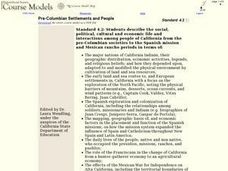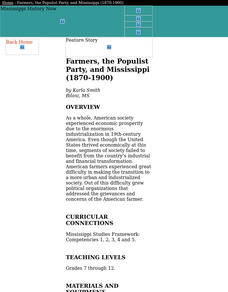Curated OER
The European Union
Ninth graders construct a timeline depicting the development of the European Union and label and color countries on a map belonging to it. They write essays about how the Union affects the United States.
Curated OER
Rivers And Capitals
Pupils become familiar with the use of GIS for research and become aware of the importance of rivers to cities. They also analyze the placement of cities and learn the names of rivers in the United States.
Curated OER
Using Oral History to Understand Immigrant History
Learners use oral history to comprehend how life chaned for men, women, and childern when they immigrated to the United States. Students conduct interviews with immigrants in an attempt to interpret hardships, lifestyles, careers, and...
Delegation of the European Union to the United States
The Founding and Development of the European Union
How did Europe transition from a period of conflict to a period of sustained peace? As class members continue their study of the history and development of the European Union, groups examine the events in six time periods, from the EU's...
West Virginia Department of Education
History Scene Investigators - John Brown's Raid
An informative resource covers the event of John Brown's Raid, an event that became an important part of West Virginia history. It serves as a standalone and covers the event and John Brown's life in depth using group work, online...
Core Knowledge Foundation
Thanksgiving with the Pilgrims
Teach kindergartners about the First Thanksgiving with a series of lessons about the Pilgrims' journey to the New World. As they practice handwriting, CVC words, reading comprehension, and fun Thanksgiving songs, they learn about what...
Curated OER
Raton Pass and Glorieta Battlefield
Students complete a variety of activities that go along with the study of and possible fieldtrip to Raton Pass and Glorieta Battlefield on the Sante Fe Trail in New Mexico.
Curated OER
Geography And The Revolutionary War
Students gain a deeper understanding of both geography and the Revolutionary War. They practice using on line research in examining historical events and using political, physical, and topographic maps.
Curated OER
Multinational Corporation Relocation
Students examine and analyze the concept of why multinational corporations relocate production facilities from developed nations to less developed nations. They explore the patterns and networks of economic interdependence incorporating...
Curated OER
Decolonization and Self-Determination
High schoolers define and discuss colonialism and self-determination. After reading the European's view on the topic, they analyze a map of imperialism in 1914. They watch excerpts of a video and take notes on various United Nations...
Curated OER
Oh Canada!!
Fifth graders become familiar with the people, culture, government and geography of Canada. In this Canadian people and places lesson plan, 5th graders research and create a map of Canada reflecting their gathered information. ...
Curated OER
Pre-Columbian Settlements and People
Fourth graders describe the social, political, cultural and economic life and interactions among the people of California from the pre-Columbian societies to the Spanish mission and Mexican rancho periods.
Curated OER
Never To Forget
Tenth graders discuss the events leading up to antisemitic behavior in Europe during World War II. Through various activities, 10th graders acquaint themselves with the political ideology of Nazism and assess responsibility for the...
Curated OER
Controlling the Flow of the Colorado River: A Study of Dams
Students research and map the Colorado River and its dams and predict the effects of a dam on an area. They suggest reasons a dam would be built and compare the Colorado River system with other major river systems within the US and...
Curated OER
Geography of Southeast Asia
Ninth graders study the geography and culture in ten Southeast Asian countries. They examine the development of the culture of these countries and how it is affected by their geographic locations.
Curated OER
Is A Nation Always A Region?
Students define the term, "nation," and analyze the boundaries established in Africa by colonial powers. In small groups, they participate in a simulated United Nations, develop a list of questions, analyze the nations of Africa, and...
Curated OER
Korean War
Students identify and interpret general information about the Korean War, including important dates, terms, events, and participants. They also identify what the Cairo Declaration was and what military forces, political forces, and...
Curated OER
Elections in America
Eleventh graders examine the election process in America. In this US Government lesson, 11th graders analyze the problems with the Electoral College. Students research a specific state and create a state flash card in regards to the...
Curated OER
Native Americans and Topography at Rose Bay
Students visit a wetland ecosystem. While they are there, students explore how to read topography maps of Rose Bay.
Curated OER
Country Capitals
Students define the meaning of country capital. In this country capital lesson, students identify the symbol and find country capitals. Students locate and label capital cities on a map and insert the capital symbol.
Curated OER
Geographic Context for War
Students explore the geography of Korea. In this Korean War lesson, students examine maps of the country and label landforms, bodies of water, climate, population centers, and neighboring countries to determine the significance of...
Curated OER
Ireland
Second graders discuss Ireland including its politics, education system, agriculture, etc . . . They locate Ireland on a map, and list facts about the country. They compare Irish money to American money.
Curated OER
If the World Were a Village
Students examine the conditions of the global economy. As a class, they discuss the political, economic and cultural differences around the world. They review the concepts of distribution and scarcity and identify the costs and...
Curated OER
Farmers, the Populist Party, and Mississippi (1870-1900)
Pupils determine the cause and effect of a historical event. They draw conclusions about statistical data and maps and compose a campaign speech for a Populist candidate. They design a political poster and badge for the Populist Party.

























